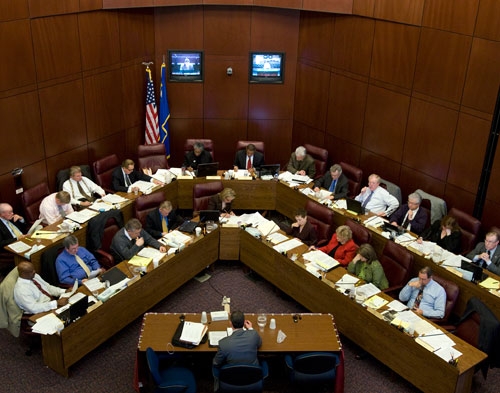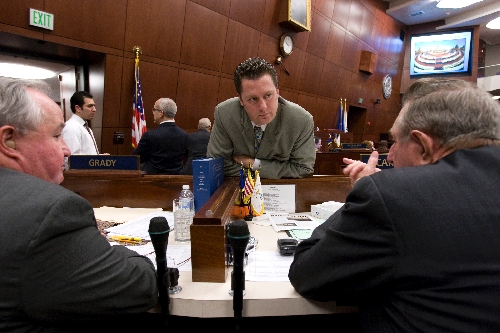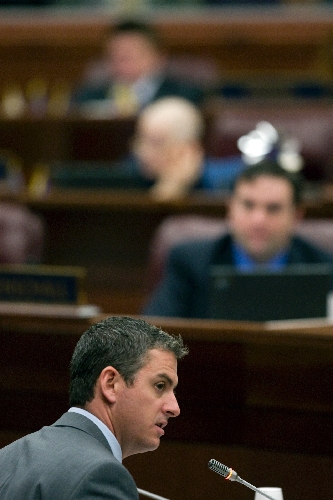Governor meets rejection on Day Two
CARSON CITY -- Lawmakers on Wednesday rejected Gov. Jim Gibbons' proposals to raise money by limiting mining tax deductions and using cameras to catch insurance scofflaws and angrily dismissed his demand to end the special session by 11:59 p.m. Sunday.
Democratic leaders said the governor has no legal right to tell them when to adjourn -- even as the Assembly and Senate steamed ahead on Day Two by putting together lawmakers' own budget plan, which they hope to complete before the weekend deadline anyway.
"We don't want to take one extra day," Senate Majority Leader Steven Horsford, D-Las Vegas, said in an interview after meeting with Democratic leaders in both houses to ensure they're in lockstep.
As for Gibbons' deadline, Horsford rolled his eyes and said, "He doesn't have the authority to tell us when to adjourn."
Democratic Assembly Speaker Barbara Buckley, D-Las Vegas, agreed that the idea is to finish before the week is out, and she wouldn't talk about a possible legal showdown with Gibbons if it takes longer.
"I am not going to speculate on what happens in the event of failure," Buckley said. "I'm going to focus on successes."
The Legislature was in session from 9 a.m. to shortly after 7 p.m. Tuesday.
As part of the developing Democratic budget plan, the mining industry would contribute voluntarily or through fees up to $100 million -- a figure that is the subject of intense talks among industry representatives, Democrats and key Senate Republicans who have said they will not support the deal unless the mining industry agrees on the number.
Getting Republicans to accept the final package aimed at closing an $887 million budget gap is vital to survive an anticipated veto from Gibbons, who has been launching near-daily political missiles at the Legislature.
The latest gubernatorial strike came Wednesday when Gibbons amended his proclamation that called for the special session and ordered lawmakers to adjourn by 11:59 p.m. Sunday. If they don't, he will disband it.
The governor also requested that legislators review his eight-point education plan announced earlier in the month.
Under Gibbons' plan, the state would end mandatory requirements for class-size reduction and full-day kindergarten, suspend collective bargaining rights for school workers and disband the state Board of Education. He wants to offer state support to students who attend private schools and to require the state superintendant of public instruction to report to him.
Horsford dismissed the education plan, saying lawmakers do not have time in the special session to deal with it, a move that is sure to escalate tensions with the Republican governor.
Even where lawmakers and Gibbons appear to agree, they end up disagreeing, as in the case of the federal Race to the Top education grant program, which Gibbons added to the special session agenda in his updated proclamation.
The Senate, on a 16-5 vote, and the Assembly, on a 42-0 vote, on Wednesday swiftly approved Gibbons' request to change state law so that Nevada could qualify for a $175 million Race to the Top grant. That was a Democratic desire, although it doesn't help the budget.
But the governor's office said Gibbons would veto the bill because he did not like the language lawmakers included in the measure.
Lawmakers have agreed to about half of Gibbons' proposed cuts, which would slash about 10 percent from most state agencies.
The Assembly ordered the drafting of a bill to put into effect one of Gibbons' ideas that would save $12 million a year: a 10-hour, four-day workweek for state employees. That would include the university system but not public school districts. Workers also would take one unpaid furlough day a month.
But the lower house rejected the governor's proposed 10 percent cut for public education. Instead, the Assembly agreed to make it their goal to cut state funding for the K-12 system by only 5 percent.
Under Gibbons' plan, state education funding would be reduced by $176 million. But Buckley called that an intolerable amount because more than 2,000 teachers in Clark County could be laid off. The 5 percent reduction would result in an $88 million cut.
The minority Republicans agreed.
"We can do better than laying off thousands of teachers," said Assembly Minority Leader Heidi Gansert, R-Reno.
Democrats have to come up with $300 million to $400 million in revenue if they want to save education and social services from deep cuts. Mining remains the biggest funding target.
Assembly Majority Leader John Oceguera, D-Las Vegas, said legislators are "almost there" in striking a deal with Nevada's mining industry. He said it would be mostly fees with "a little" from tax pre-payments for a total of $75 million to $100 million to the state.
"Mining has stepped up and said they want to be part of the solution, so it is just the fine details on how that solution comes about," Oceguera said.
Horsford was holding firm for now at the higher figure, saying, "I really expect mining to come to the table with a $100 million solution."
Key Senate Republicans were cautious.
Sen. Dean Rhoads, R-Tuscarora, said mining company executives have told him they are willing to give the state $30 million to $40 million to help with the budget crisis.
Also, they expect to give $60 million more to the state March 1 when they make their net proceeds tax payments, said Rhoads, whose district contains 95 percent of Nevada's gold mines. The new revenue comes from the price of gold topping $1,100 an ounce.
Senate Minority Leader Bill Raggio, R-Reno, said he wanted more from the mining industry, too.
Jim Wadhams, a lobbyist representing Newmont Mining Corp., called $100 million an "astronomical number," but he added that the industry was making an "earnest attempt" to reach agreement.
"The companies have an interest in helping," Wadhams said. "There is no commitment yet. We're talking. It's an open dialogue."
It is unclear what the governor will do if he is presented with a mining revenue request in the final legislative budget package.
His chief of staff, Robin Reedy, said Wednesday that the governor probably would accept a new mining revenue plan if the industry agreed to it, but Gibbons' actions have been hard to predict.
"If the people who are paying the fee or tax agree to it, that was one of his litmus tests," Reedy said in an interview.
Beyond mining, Democrats were counting on getting as much as $64 million from the gaming industry for the state general fund by making casinos pay for their own Gaming Control Board regulation, most likely on a tiered basis so that smaller casinos pay less than larger resorts.
The banking industry probably will be tapped for as much as $40 million by charging them a $500 fee for filing foreclosure notices.
In another revenue-raising measure, the Assembly approved drafting a bill that would sweep $199 million from many state accounts into the general fund. That is less than Gibbons' proposal, which would have captured $222 million from such a sweep.
But lawmakers in the Senate and Assembly killed another potential source of revenue: Gibbons' proposal to raise $30 million by photographing license plates and determining whether vehicles are insured and properly registered.
In both houses, the Democratic leaders asked whether the idea merited further consideration, and lawmakers agreed to dump the idea, mostly because InsureNet, the company that would run the program, hadn't been questioned by lawmakers and there was no time to do a full review.
Twenty-two percent of Nevada motorists drive without insurance. The state collects a $250 fine from owners of uninsured vehicles and a $500 fine from vehicle owners who do not have valid registration.
Contact Laura Myers at lmyers@reviewjournal.com or 702-387-2919. Contact Capital Bureau Chief Ed Vogel at evogel@reviewjournal.com or 775-687-3901. Contact reporter Benjamin Spillman at bspillman@reviewjournal.com or 702-477-3861.
Nevada Legislature Special Session slide show
























